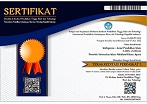THE EFFECT OF THE MA’HAD AL-JAMI’AH ACADEMIC COMPETENCY IMPROVEMENT PROGRAM ON AQIDAH, WORSHIP, AND MORALS OF STUDENTS
Abstract
Keywords
Full Text:
PDFReferences
Afid Burhanuddin (2015) “Tahapan pembentukan karakter,” TAHAPAN PEMBENTUKAN KARAKTER.
Cahya, F. S., Bahri, S. dan Hayaturrohman, H. (2016) “Nilai-Nilai Karakter dalam Kitab Al-Akhlaq Lil Banin Karya Syekh Umar Baradja,” Jurnal Online Studi Al-Qur’an. doi: 10.21009/jsq.012.1.05.
Burhanuddin, “Dampak Kegiatan Keagamaan Rohis melalui Kajian Kitab Kuning bagi Akhlak Peserta Didik” (2019) HIKMATUNA: Journal for Integrative Islamic Studies. doi: 10.28918/hikmatuna.v5i1.1837.
Delener, N. (1994) “Religious Contrasts in Consumer Decision Behaviour Patterns : Their Dimensions,” European Journal of Marketing.
Didik, S. (2015) “Perkembangan Nilai Agama Dan Moral Anak,” Perkembangan Nilai Agama dan Moral Anak dan Pendidikan Keagamaan Orangtua.
Eisinga, R., Konig, R. dan Scheepers, P. (1995) “Orthodox Religious Beliefs and Anti-Semitism: A Replication of Glock and Stark in the Netherlands,” Journal for the Scientific Study of Religion. doi: 10.2307/1386766.
Fitri, A. Z. (2016) “KELUARGA SEBAGAI LEMBAGA PERTAMA PENDIDIKAN ISLAM,” Jurnal Pendidikan Islam. doi: 10.15575/jpi.v27i1.493.
Hafidah, H. dan Makruf, I. (2020) “Pengembangan model manajemen Ma’had Al-Jami’ah IAIN Surakarta,” Ta’dibuna: Jurnal Pendidikan Islam. doi: 10.32832/tadibuna.v9i1.2357.
Komarudin, Y. (2020) “KORELASI ANTARA PENGETAHUAN AGAMA ISLAM DAN PENINGKATAN KUALITAS PERILAKU BERAGAMA PESERTA DIDIK DI SMA NEGERI I TAKALAR,” TANJAK: Journal of Education and Teaching. doi: 10.35961/tanjak.v1i1.83.
Ma’ruf, M. (2018) “MEMBANGUN KEDISIPLINAN SISWA MELALUI AKTIVITAS KEAGAMAAN (Studi Kasus di SMKN 1 Grati Pasuruan Jawa Timur),” journal EVALUASI. doi: 10.32478/evaluasi.v2i2.166.
Manan, S. (2017) “Pembinaan Akhlak Mulia Melalui Keteladanan Dan Pembiasaan,” Jurnal Pendidikan Agama Islam -Ta’lim.
Mukhtaruddin, M. (2011) “Standarisasi Penguasaan Kitab Kuning,” Analisa. doi: 10.18784/analisa.v18i2.131.
Othman, M. K. (2013) “Keperluan Penghayatan Nilai Dalam Pembangunan Akhlak Dan Moral Pelajar,” Prosiding Halaqah Nasional & Seminar International Pendidikan Islam.
Sugiharto, R. (2017) “PEMBENTUKAN NILAI-NILAI KARAKTER ISLAMI SISWA MELALUI METODE PEMBIASAAN,” Educan : Jurnal Pendidikan Islam. doi: 10.21111/educan.v1i1.1299.
Sugiyono (2012) “Metode Penelitian Kuantitatif, Kualitatif dan R & D.Bandung:Alfabeta.,” Metode Penelitian Kuantitatif, Kualitatif dan R & D.Bandung:Alfabeta. doi: 10.1017/CBO9781107415324.004.
Tohirin, A. (2010) “the Cash Waqf for Empowering the Small Businesses,” The Tawhidi Epistemology: Zakat and Waqf Economy.
DOI: https://doi.org/10.34001/intelegensia.v9i1.1804
Article Metrics
Refbacks
- There are currently no refbacks.
Copyright (c) 2021 Intelegensia : Jurnal Pendidikan Islam

This work is licensed under a Creative Commons Attribution-ShareAlike 4.0 International License.
Currently this Journal is Indexed by

This work is licensed under a Creative Commons Attribution-ShareAlike 4.0 International License.











